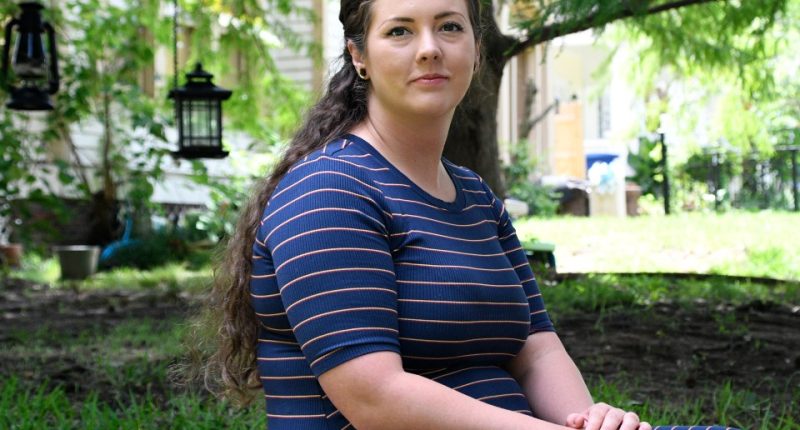Share this @internewscast.com
SCAMMERS enrolled a woman in college without her knowledge, taking out a $9,000 loan in her name.
Heather Brady was confused when an officer came to her San Francisco home and asked if she had applied to Arizona Western College.
But Brady hadn’t, and the officer believed someone else had applied to the school using Brady’s name in a scheme to get financial aid money.
Brady checked her student loan servicer account and saw that the scam had gone further.
A $9,000 loan had been paid out in her name—to another person—for a course at a college in California.
“I just can’t imagine how many people this is happening to that have no idea,” she told ABC News.
She wasn’t the only victim, as Wayne Chaw received emails about a class he never signed up for at De Anza Community College in Cupertino, California.
Chaw attended the college about a decade earlier, but identity thieves used his Social Security number to collect $1,395 in financial aid.
The energy management class that the scammers enrolled in required students to submit an assignment to prove they were real.
Chaw told the outlet that the thieves wrote submissions pretending to be him, likely using a “ghost student” or chatbot.
“This person is typing as me, saying my first and last name,” said Chaw.
“It’s very freaky when I saw that.”
Because the fraud involved a grant and not loans, Chaw didn’t lose any money.
He tried calling the Social Security Administration to report the theft but was left on hold for over five hours and never got through to a person.
AI CRIME
Now that artificial intelligence is readily available and online classes have risen in popularity, financial aid fraud has exploded.
Fake college enrollments have turned into a growing problem, where crime syndicates employ chatbots to register for online courses just to stick around long enough to receive financial aid disbursements.
Instructors are stunned when they realize that nearly all of their students are not genuine; at the same time, real students face the issue of being unable to enroll in essential classes because bots have filled them beyond capacity.
For individuals who find out that loans have been fraudulently taken out under their names, they endure months of contacting colleges, the Federal Student Aid office, and loan servicers to remove the unauthorized debt.
Last week, the Department of Education introduced a temporary ruling that requires college students to show government-issued IDs to prove their identities.
The rule only applies to first-time applicants for federal student aid for the summer term, affecting about 125,000 students.
The department said it’s developing a thorough screening for the upcoming fall semester.
“The rate of fraud through stolen identities has reached a level that imperils the federal student aid program,” the agency said in a statement.
The Associated Press found that California colleges reported 1.2 million fake applications in 2024, which resulted in 223,000 suspected fake enrollments.
Other states are having the same problem; however, California appears to be a target with more than 116 community colleges.
Scammers have stolen at least $11.1 million in federal, state, and local financial aid from the state’s community colleges last year that couldn’t be recovered, according to the reports.
Colleges will normally receive a portion of the loans that are for tuition, with the balance going to students for other expenses.
Community colleges are typically targeted because of their lower tuition, which means a larger percentage of grants and loans go to borrowers.
Scammers will use chatbots in their schemes, targeting online classes that allow students to watch lectures and complete work on their own time.
OTHER CASES
The Trump Administration has fired more than 300 people from the Federal Student Aid office in its attempts to dismantle the Department of Education.
The cuts may make it harder to catch the scammers and help victims of identity theft.
“I’m just nervous that I’m going to be stuck with this,” said Brady.
“The agency is going to be so broken down and disintegrated that I won’t be able to do anything, and I’m just going to be stuck with those $9,000.”
Brittnee Nelson, from Shreveport, Louisiana, received a notification that her credit score dropped 27 points after it was revealed that loans were taken out in her name.
She was able to cancel one of the loans before it was paid out, but it was too late to stop the other for $5,000 for Delgado Community College in New Orleans.
Despite signing up for identity theft protection and carefully monitoring her credit, her debt almost went into collections before the loan was put in forbearance.
She was able to get the loans taken off her record after two years of trying.
“It’s like if someone came into your house and robbed you,” she said.
Nelson believes that the federal government’s efforts to verify borrowers’ identities could help.
“If they can make these hurdles a little bit harder and have these verifications more provable, I think that’s really, really, really going to protect people in the long run,” she told the outlet.
Barbara Waiters, a spokesperson for Delgado, said that the responsibility for approving loans lies with federal agencies.
“This is an unfortunate and serious matter, but it is not the direct or indirect result of Delgado’s internal processes,” she said.




















